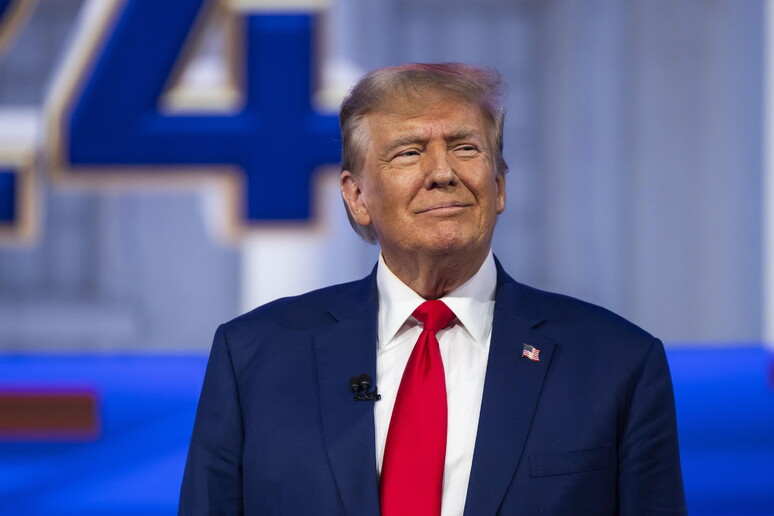Tuesday will mark 100 days since President Trump was inaugurated for his second term. An important day, as the first three months of a presidency are generally considered the period during which the White House’s agenda for the coming years is shaped. The President will travel to Michigan on Tuesday to celebrate this event at a time when public sentiment is deeply disillusioned with his leadership due to the chaos that he has created since returning to the White House.
A Pew Research Center survey conducted a few days ago found that his approval rating currently stands at 40%, while his disapproval rating is at 59%. Another poll, published by CNN and conducted by SSRS, found that Trump has the lowest approval rating of any newly elected president at the 100-day mark since Dwight Eisenhower. Trump’s approval ratings have dropped by four points since March and are seven points lower than they were at the end of February.

According to the survey, only 22% of respondents strongly approve of Trump’s conduct, a new low while about 45% strongly disapprove. On the same day, another survey conducted by The Washington Post, ABC News, and Ipsos indicated that the President “faces growing opposition to his ambitious and controversial agenda” and that his approval rating is declining. Half of the voters interviewed said they disapproved of Trump’s trade policies with other countries, and 61% stated that a president should not have the authority to impose tariffs without Congress’s approval.
In another poll, conducted by The New York Times, 63% of voters including 40% of Republicans, said that “a president should not be allowed to deport immigrants holding legal visas just because they participated in protests against Israel.” The Associated Press also painted a critical picture last Thursday, highlighting in a survey that about half of respondents believe Trump’s trade policies will drive up prices, and that they are “extremely” or “very” concerned about the possibility of a recession in the coming months. Even Fox News, traditionally an ally of Trump, highlighted that only 38% of Americans approve of his handling of the economy, while 56% disapprove.
What’s more significant for Trump is that only 54% of Republicans who voted for him believe he is focusing on the “right priorities,” while 46% believe he is too closely aligned with MAGA extremists. Among independent voters who, with 34% of the electorate, represented the largest voting group in the last elections, ahead of Republicans (33%) and Democrats (32%) only 9% said they would vote for Trump again today. Immediately after the election, the President’s approval rating stood at 52%, but it has steadily declined since then.
Polls suggest that the loss of popularity is due to his management of the economy, his lack of respect for the rule of law, and the chaos resulting from the mass firings orchestrated by Musk within the federal administration. So far, Trump has governed mainly through executive orders, many of which have been challenged in court, presidential decrees that have largely satisfied only the most hardline wing of the Republican Party. It has been an aggressive assault launched by the President to force change and attempt to push his agenda out of Congress’s quicksand.
It remains to be seen whether he will succeed. So far, despite futile grumbling from the Democrats and some scolding from the judiciary, he has prevailed. Moreover, the President is a master of preemptive moves: when things are not going his way, he always finds a way out–a theatrical move that suddenly boosts his standing.
Now, on the eve of the 100-day milestone, with all polls condemning him, he pulls from his magician’s hat the “rediscovery” of Christopher Columbus, who was vilified and condemned by the left-wing “woke” movement during protests against police brutality, but now should be rehabilitated. The decision will enrage his critics but will surely earn him further support from the Italian-American community, which already largely backs him. Most presidents take months or even years to push through reforms and must navigate Congress to do so.
This time, however, through unprecedented use of executive powers, Trump has already cut the federal workforce, banned diversity programs, dismantled USAID, and forced traditional U.S. allies to rethink their strategies for dealing with this new reality.
He has repeatedly stated his desire to annex Canada and Greenland and has even revoked the trade agreements with Mexico and Canada that he himself had signed during his first term. It is a chaos deliberately orchestrated, destabilizing rules and certainties, to mobilize his base by presenting himself as an outsider fighting a “corrupt system,” thus reinforcing his “us versus them” narrative. A chaos that has weakened institutions, media outlets, foreign governments, and even allies, who have struggled to adapt to his logic and consequently, lost ground.
He is convinced that through chaos, he can create pressure to secure more favorable terms in trade relations. Furthermore, through chaos, he has managed to delegitimize the judiciary and the legal system and render proceedings against him irrelevant. Presidents come and go, but the United States remains.
Yet, after Trump’s presidency, America will no longer be the same..
Top

Trump’s First 100 Days: Chaos as a Strategy to Amass Power

Approval ratings in free fall, weakened institutions, and rising international tensions











